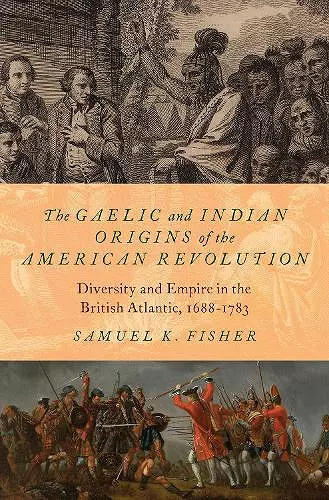The Gaelic and Indian Origins of the American Revolution
Diversity and Empire in the British Atlantic, 1688-1783
Format:Hardback
Publisher:Oxford University Press Inc
Published:13th Oct '22
Should be back in stock very soon

This book reveals how marginalized groups influenced the American Revolution, highlighting the roles of Gaelic and Indian peoples in shaping imperial dynamics and colonial identity.
In The Gaelic and Indian Origins of the American Revolution, Samuel K. Fisher explores the unexpected roles played by Irish-speaking Catholics, Scottish Highlanders, and American Indians in the lead-up to the American Revolution. By utilizing underappreciated sources in Irish and Scottish Gaelic, Fisher brings these often-overlooked groups into the spotlight, revealing how their experiences of colonization in the eighteenth-century British Empire contributed to a larger narrative of imperial reform and rebellion. These marginalized peoples forged connections with the monarchy and imperial authorities, ultimately challenging the exclusionary practices of the British Empire.
The narrative unfolds against the backdrop of a complex imperial struggle, where Gaelic and Indian communities sought to redefine their place within a rapidly changing world. Their efforts not only influenced the dynamics of power but also provoked tensions among traditional colonial elites, including Irish Protestants and Scottish Whigs. The American Revolution emerges as one significant episode in a broader conflict between an inclusive vision of empire and the exclusionary attitudes of certain British subjects. This historical examination reveals that the roots of America's racial dilemmas are intertwined with a much older and intricate imperial legacy.
Fisher's work invites readers to reconsider the American Revolution through a new lens, highlighting how the actions of Gaelic and Indian peoples were pivotal in steering American colonists toward independence. By challenging the established narratives, The Gaelic and Indian Origins of the American Revolution offers valuable insights into the complexities of identity, power, and resistance that resonate with contemporary discussions about race and inclusion.
This book is an historical tour de force. With a wonderful comparative focus on indigenous nations of North America and Scottish and Irish Gaels, Samuel Fisher has not only provided fresh perspectives on the American Revolution but also on the transatlantic movement of peoples from the British Isles in the eighteenth century. * Sir Tom Devine, University of Edinburgh *
In 1776, the British Empire was a diverse, multinational dominion, but it was also a dominion run by — and almost exclusively for the benefit of — British, Irish, and Anglo-American Protestants. In this important, wide-ranging book, Samuel K. Fisher shows how unresolved questions over the place of Irish Catholics and Native Americans within Britain's eighteenth-century empire helped drive the conflicts that tore that empire apart. The result is a new and compelling account of the American Revolution's origins. * Eliga Gould, author of Among the Powers of the Earth: The American Revolution and the Making of a New World Empire *
Samuel Fisher looks to British, rather than purely English, history to explain why the elite in thirteen of Britain's American colonies decided suddenly in the 1770s that the imperial government had become oppressive and must be rejected. In this provocative and timely book, Fisher demonstrates how the attempt by George III to include Native Americans within his empire proved as offensive to 'exclusionary patriots' as had the actions of James II in treating Scottish Highlanders and Irish Catholics as equals with his Protestant subjects in the three kingdoms. * Nicholas Canny, National University of Ireland, Galway *
With a long view and an Atlantic perspective, Samuel Fisher explains how Irish Catholics, Scottish Highlanders, and American Indians reshaped the British Empire, and in doing so helped bring about the American Revolution. Thoughtfully and systematically considering empire, revolution, and nation-building in terms of inclusion and exclusion, this book challenges easy assumptions about tyranny and freedom in the eighteenth century and about the kind of society American revolutionaries created. * Colin G. Calloway, author of White People, Indians, and Highlanders: Tribal Peoples and Colonial Encounters in Scotland and America *
The Gaelic and Indian Origins of the American Revolution is a refreshing work of intellectual history... Fisher has read and interrogated primary sources and secondary literature with diligence and care. In doing so, he has offered eighteenth-century historians an invitation to revisit the structures of colonial rule in North America as well as the reasons behind the eruption of the American War of Independence. * Ioannes P. Chountis, Journal for Eighteenth-Century Studies *
- Winner of Honorable Mention, 2023 Donald Murphy Prize.
ISBN: 9780197555842
Dimensions: 161mm x 238mm x 29mm
Weight: 730g
336 pages